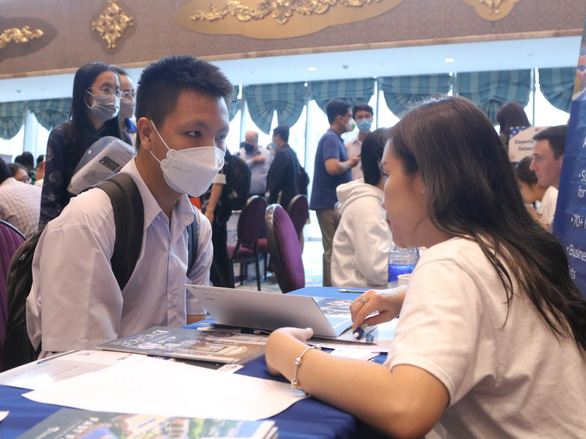Vietnam is leading Southeast Asia and ranks sixth in the world in the number of students studying at U.S. higher education institutions, Consul General in Ho Chi Minh City Susan Burns announced at an exhibition on American education on Thursday.
Consul General Burns was speaking at EducationUSA Fall Fair 2022, held by EducationUSA at the Reverie Saigon in District 1, and hosted by the U.S. Consulate General in Ho Chi Minh City.
The event, which was held offline for the first time since the start of the COVID-19 pandemic, attracted hundreds of students and parents who wished to explore opportunities for higher education studies in the U.S..
Currently, around 30,000 Vietnamese students of all ages are studying in the U.S., Consul General Burns said at the event.
Vietnam currently ranks as the sixth leading country of origin for all international higher education students in the U.S. and accounts for the biggest portion of Southeast Asian students in America, according to the consul general.
Specifically, Vietnam had 21,631 students studying at U.S. colleges and universities for the 2021-22 academic year, the U.S. Embassy elaborated on its website.
EducaitonUSA Fall Fair 2022 provided guests with information about degree programs, career perspectives, scholarships, and financial aid for studies in the U.S., the embassy said.
About 60 higher education institutions from 21 U.S. states participated in the event.
Mundy Yiu, deputy director of the international admissions office of the University of Miami, told Tuoi Tre (Youth) newspaper that Vietnam is among the markets from which most American universities want to attract new students.
With good qualifications in both academic and foreign language skills, many Vietnamese students are welcomed to universities in the U.S., Yiu commented.
Regarding enrollment policies, Lan Nguyen, a representative of the admissions office at Georgia State University, said many American universities will continue to waive Scholastic Aptitude Test (SAT) certificates as a condition for admission.
This policy was adopted during the COVID-19 pandemic when students in many countries could not sit for SAT exams and many SAT training centers were forced to shut down, the representative said.
However, it is likely that schools will reinstate requirements for the SAT test in 2024, Nguyen added.
With the pandemic under control, many American universities now offer flexible learning options for international students, said Xuan Li, Northeastern University’s international program coordinator in Asia.
For example, foreign students at Northeastern can either study in the U.S. for the full term or take online classes for the first 1-2 years before attending physical classes in the U.S. for the rest of their programs, Li said, adding that this mixed-learning approach helps facilitate the process of achieving academic goals.
Although many American universities offer more options for international candidates, Vietnamese students should think carefully before making a decision to enroll in a university in the U.S., Nguyen Hien, a representative of Northern Arizona University, advised.
When choosing a school, students should focus on their preferences and strengths, not merely on its reputation or current trends, Hien recommended.
The same education exhibition was hosted by the U.S. Embassy in Vietnam in Hanoi on Tuesday.
EducationUSA is a U.S. Department of State-supported network of over 430 international student advising centers in more than 175 countries, according to the U.S. Embassy.
The network provides Vietnamese students and parents with accurate, comprehensive, and current information about how to apply to accredited U.S. colleges and universities, the embassy said.
Like us on Facebook or follow us on Twitter to get the latest news about Vietnam!




















































